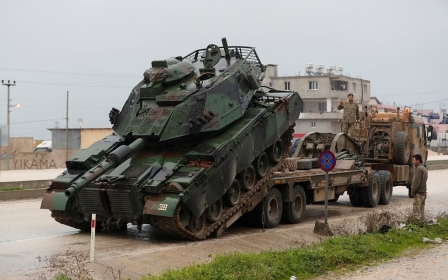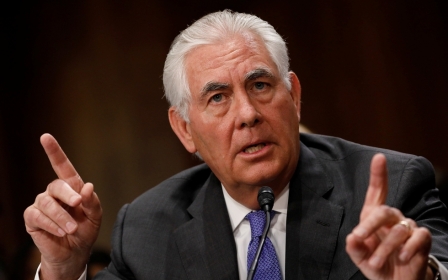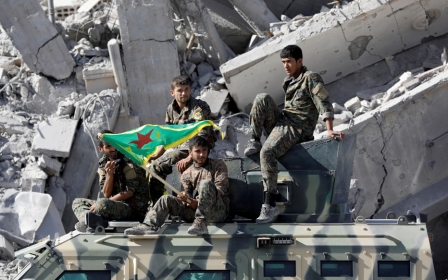Turkey dismisses US denial of plan for pro-Kurd border force in Syria
Turkey has said Washington's denial of reports it would build a Kurdish-dominated border force in Syria was "not satisfying", and that it would not remain silent in the face of any force that threatened its territory.
Turkey reacted angrily after the US-led coalition said it would help its Syrian militia allies, dominated by the pro-Kurdish People's Protection Units (YPG), to set up a new 30,000-strong force.
Only actions matter now. We have seen many broken American promises
- Mevlut Cavusoglu, Turkish foreign minister
The US secretary of state, Rex Tillerson, said on Wednesday he had met his Turkish counterpart Mevlut Cavusoglu to clarify the issue and said the situation had been "misportrayed, misdescribed. Some people misspoke".
But Cavusoglu said in television interviews on Thursday that Tillerson's backtracking was "not satisfying".
"They [the US] also didn't keep their promise on Manbij," he said in reference to Washington's failure to deliver on assurances that their Kurdish allies would withdraw from the Syrian town after clearing it of Islamic State.
"Only actions matter now. We have seen many broken American promises."
The Turkish prime minister, Binali Yildirim, meanwhile said "America's conflicting statements shows their confusion about the region".
Tillerson's denial comes days after the US-led coalition said it was working "jointly with the Syrian Democratic Forces to establish and train the new Syrian Border Security Force".
"Currently, there are approximately 230 individuals training in the BSF’s inaugural class, with the goal of a final force size of approximately 30,000,” said coalition spokesman Thomas Veale.
“The base of the new force is essentially a realignment of approximately 15,000 members of the Syrian Democratic Forces to a new mission in the Border Security Force as their actions against IS draw to a close.”
Veale added that recruitment had commenced for another 15,000 soldiers.
Afrin attack
On Thursday, Turkish artillery struck targets in the YPG-controlled region of Afrin in northwestern Syria, as Turkey appeared to continue preparations for an invasion.
Cavusoglu said Turkey was in talks with Russia and Iran on the use of airspace over Afrin, while Turkish media reported sections of a concrete barrier along the Turkish-Syrian border had been removed by Turkish forces.
Turkey has sent troops, heavy armour and artillery to the area near Afrin.
The Syrian government on Thursday threatetend to shoot down Turkish jets attacking Afrin. A smiliar threat was issued at the start of Turkey's Operation Euphrates Shield, but no Turkish jets were targeted.
The YPG appealed on Wednesday to world powers to stop a threatened Turkish attack on Afrin, as the US reportedly said it had no ties with pro-Kurdish forces in the enclave.
"The coalition's mission has not changed: to defeat ISIS in designated areas of Iraq and Syria, and set conditions for follow-on operations to increase regional stability," US army Colonel Ryan Dillon was quoted as saying by the Turkish state news agency Anadolu.
"We are not operating in Afrin."
Adrian Rankine-Galloway, a US defence department spokesperson, told Anadolu Agency: "We don't consider them as part of our 'defeat ISIS' operations, which is what we are doing there and we do not support them. We are not involved with them at all."
In its statement, the YPG said Afrin "will not be alone" and that all of northern Syria would aid its defence.
"The Turkish regime... has become a threat to any solution to the Syrian crisis," it added.
Ankara has warned in recent days of an imminent military operation in Afrin, one of three autonomous cantons under the control of Kurdish forces and their allies.
Ankara views the YPG as an extension of the Kurdistan Workers' Party (PKK) militant group, which has fought an insurgency in southeast Turkey since 1984.
Turkey, the US and the EU deem the PKK a terrorist group.
Turkey and the US, both allies in Nato, have been on the same side for much of Syria's civil war, both supporting rebels fighting to overthrow Bashar al-Assad.
But a decision by Washington to back Kurdish forces fighting against Islamic State infuriated Ankara.
New MEE newsletter: Jerusalem Dispatch
Sign up to get the latest insights and analysis on Israel-Palestine, alongside Turkey Unpacked and other MEE newsletters
Middle East Eye delivers independent and unrivalled coverage and analysis of the Middle East, North Africa and beyond. To learn more about republishing this content and the associated fees, please fill out this form. More about MEE can be found here.




